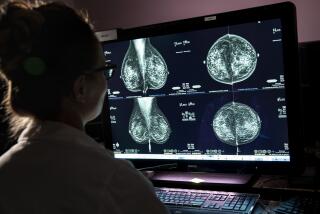Benefits of Mammograms
- Share via
* I am most concerned about “Study Suggests Need for Fewer Breast Exams” (Nov. 24). As one of the authors of the study, I am particularly disturbed that the article misinterprets the data we presented.
What the article should have said is that our study of over 30,000 women shows that mammography screening finds breast cancer at an equally early stage in women from age 40 up to age 70. What we found was that breast cancer is less common in average-risk women under 50 than it is in women over 50 and in women under 50 who have a strong family history of breast cancer. Fewer cancers are found in younger average-risk women, not because mammography isn’t picking these cancers up, but because there simply are fewer cancers to find.
My conclusion from the data is that mammography screening is more cost-effective for women over 50, but it is equally effective as a potentially lifesaving screening test for women under 50.
EDWARD A. SICKLES MD
Professor of Radiology
UC San Francisco
* As a mammographer, who is responsible for assisting many of the surgeons in the Pasadena area in the localization of breast abnormalities prior to biopsy, I read your article with great interest, and some alarm. Every case that requires the assistance of a radiologist in localizing for surgery has been discovered by a mammogram. My partners and I have performed 146 of these localizations in the past two years that have found breast cancer or pre-cancerous lesions. Of these, 32 lesions, 31 cancers and 1 pre-cancer, or 22%, were in women under the age of 50.
To follow the recommendations as stated in your report on the study would have reduced the chance of survival for these women from about 90% to 98% to about 50% to 60%. In our practice alone this would have meant the deaths of about 10 to 13 women who are now alive and free of disease, and mastectomies in many of the rest.
We are finally recognizing that women have been shortchanged by traditional medicine, both in research and treatment, even though as a group they tend to be more willing to undergo preventive care. Breast cancer is the leading killer of women in their late 40s.
Screening mammography is not a perfect tool, but at this time it is about the only tool we have to find breast cancer early.
The emphasis should not be on throwing away the tool, but rather on improving imaging tools and the abilities of those physicians using them, to find those cancers now missed, and to reduce the biopsy rate in those women who have findings, that subsequently are shown not to be cancerous or pre-cancerous.
KEVIN M. KELLY MD
Pasadena






